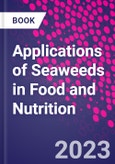Applications of Seaweeds in Food and Nutrition provides an overview on the cultural, biological and engineering dimensions relating to seaweed as a food. With the need for sustainable and healthy foods growing, this comprehensive resource explores how seaweeds can deliver not only nutritional benefits, but also antiviral and antibacterial properties as a food additive and within food processing and manufacturing. Recent developments show that the use of seaweed extracts as a compound can prevent browning. It use in other areas such as a thickening and gelling agents in foods and cosmetics is also encouraging.
There are hundreds of different varieties of seaweed known to mankind, yet very little literature is available on the processing of these "crops." This book provides these valuable and practical insights.
Please Note: This is an On Demand product, delivery may take up to 11 working days after payment has been received.
Table of Contents
1. History of seaweeds as a food
2. Evolution, biology and genetics of seaweeds
3. Impact of environmental and marine pollution on seaweed farming
4. Seaweeds and the United Nations' Sustainable Development Goals 2022 and beyond
5. Impact of climate change on seaweeds and their future
6. Seaweed Aquaculture for Human Foods in Land Based and IMTA Systems
7. Nutritional composition of selected seaweeds
8. Alginate in food and beverage formulations
9. Seaweed extracts-treated food and their benefits for shelf life and animal/human consumption
10. Proteins extracted from brown seaweed and their potential uses as foods and nutraceuticals
11. Safety and Allergenicity of Seaweeds
12. Processing of seaweeds in industrial food application
13. Seaweed-derived snack foods: products and processing
14. Seaweeds derived by-products
15. Seaweed fermentation for the development of novel food products
16. Potentials of robotics and AI techniques for the processing of seaweeds
17. Seaweeds-derived packaging material
18. Seaweeds in Food Contact Materials: Properties, Applications and Migrations Aspects
Authors
Daniel Ingo Hefft School of Chemical Engineering, University of Birmingham, Birmingham, United Kingdom; Product Research, Campden BRI, Chipping Campden, UK. Daniel Hefft is a food engineer from Germany. He is the team lead of the Product Research and Ingredients Team within the Consulting Technologies group at Campden BRI.He is also an Honorary Research Fellow of Chemical Engineering in the School of Chemical Engineering of the University of Birmingham.
Prior to this appointment, Daniel lectured in Food Sciences, Dairy Technology/ Engineering, and Precision Agriculture at University Centre Reaseheath and served as the Academic Director of the Institute of Sustainability and Food Innovation.
He got his undergraduate degree and food engineering qualification from Technische Hochschule Ostwestfalen-Lippe with specialisation in cereal technology.
He has a MSc degree from the University of Reading and PhD in Chemical Engineering from the University Birmingham. He has been awarded Research Fellowships (2019) and a Research Affiliation in Nanoengineering (2020-2021) with the University of Birmingham.
Further he has extensive years of experience in the food industry, having worked for a range of leading companies.
His speciality are food process design and engineering. He was the founder and past CTO of Rheality Ltd (2020-2021), which utilises a novel and patented technology based on acoustic sensing and machine learning for live and in situ rheology measurements.
He is also co-inventor of a new packaging system that extends shelf-life of fresh produce without the need of active cooling.
Daniel is also the founder of the Engineering for Food and Drinks Special Interest group at the Institution of Agricultural Engineers and its current chair.
Since 2018 he gained professional recognition as a Chartered Engineer with the Institution of Agricultural Engineers. He is further involved in the Association of German Food Technologists (GDL e.V.), a lifetime member of the Society of Dairy Technology, the International Society of Food Engineering, and the Institute of Physics (IOP). He is a Chartered Scientist with the IOP since 2021.
His academic contributions include 60+ scientific publications in internationally recognised, high impact factor, peer-reviewed journals, and books. He has been awarded with the Distinguished Scientist award in Chemical Engineering by PCU in 2020.
Further, there are two patents to his name relating to the invention of an in-line rheometry device and a novel composite packaging for primary and secondary application. Charles Oluwaseun Adetunji Full Professor and Lecturer in the Microbiology Department at Faculty of Sciences, Edo State University Uzairue (EDSU), Nigeria.
Prof. Charles Oluwaseun Adetunji is a full Professor at the Department of Microbiology, Faculty of Sciences and the Director of Research and Innovation, Edo State University Uzairue (EDSU), Edo State, Nigeria. He formerly served as the Acting Director of Intellectual Property and Technology Transfer, Head of the Department of Microbiology, and Sub Dean of the Faculty of Science. Currently, he holds the positions of Chairman of the Grant Committee and Dean of the Faculty of Science at EDSU.
Prof. Adetunji is a Fellow of the Royal Society of Biology in the UK. Additionally, he serves as a Visiting Professor and the Executive Director of the Center for Biotechnology at Precious Cornerstone University, Nigeria. His research centers on applying biological techniques and microbial bioprocesses to achieve Sustainable Development Goals (SDGs) and contribute to advancements in agriculture.








